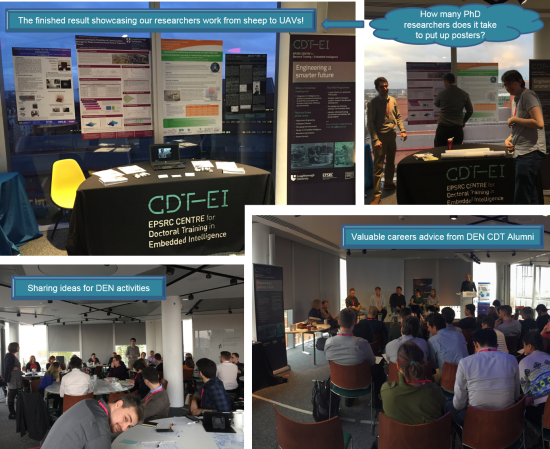Cohort 3 researcher, Darius Roman, visited the Center for Advanced Life Cycle Engineering (CALCE) to attend the Failure Analysis short course, present his research to CALCE students and faculty, and to discuss his research challenges with the CALCE team.
Darius’ PhD research project involves a fusion prognostics approach that incorporates failure analysis, modelling, condition monitoring, machine learning and prognostics techniques to predict the remaining useful life in bottom hole assembly electronics for oil and gas companies, including Baker Hughes a GE Company—his current project sponsor. Following the presentation, Prof. Michael Pecht met individually with Darius to discuss best methods and ideas to contribute to the success of the research and the project. Darius is a member of the Smart Systems Group (SSG) at Heriot-Watt University, where he acts as an ambassador. The group is led by director, Dr. David Flynn, an Associate Professor at Heriot-Watt University and Co-Director of the CDT-EI. The SSG’s view is that global society is placing increasing demands on its critical infrastructure, systems that deliver vital services such as energy, transportation, telecommunications, food and water, the built environment and healthcare. The systems within these sectors are increasingly complex and interdependent, interacting at a global scale. This complexity is required for efficient operation, but also makes them more susceptible to cascading failure under stress. The Group believe we must transform data into actionable information and utilise this insight to create innovative, data informed, Smart Systems that can assess, adapt and respond to dynamic conditions.
The collaboration between CALCE and SSG began with the seminar titled “The Era of Embedded Intelligence” where Prof. Pecht acted as a key note speaker on PHM. The seminar brought together global leaders and innovators in Embedded Intelligence from industry and academia on how this field of research is influencing future product development, business models, resilience of critical infrastructure and exploration within extreme environments. The seminar aimed to promote the importance and impact this area is making to society, and to engage the audience on how we innovate and train the next generation of engineers, scientists and business people – to prosper in this data driven age. CALCE and SSG are currently looking for future collaboration where students and academics alike could visit, exchange research ideas and discuss research challenges. Prof. Pecht will be visiting HWU periodically in an advising and educating capacity to further straighten the collaboration.
To read more about the collaboration visit here
To learn more about SSG visit here






 Cohort 3 student Gergely Hantos took part in the Cambridge Spark Applied Data Science Bootcamp.
Cohort 3 student Gergely Hantos took part in the Cambridge Spark Applied Data Science Bootcamp.
